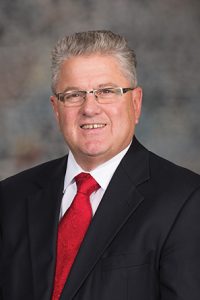Funds sought for pancreatic cancer research
The Appropriations Committee considered a proposal March 12 that would increase funding for pancreatic cancer research.

LB669, sponsored by Seward Sen. Mark Kolterman, would appropriate $15 million from the Nebraska Health Care Cash Fund to the University of Nebraska Medical Center for the establishment of a pancreatic cancer research center.
Under the bill, no funds would be distributed until the university has received $15 million in matching private or other funds for the same purpose.
Kolterman, whose wife, Suzanne, died of pancreatic cancer 18 months ago, said research about the disease is not well funded because it is relatively rare and has a high mortality rate.
He said the goal of the bill is for UNMC to become a leader in pancreatic cancer research, including developing a screening that could help prepare families for what is a “devastating” diagnosis.
“This is important research and it needs to be funded,” he said. “My wife taught me a lot of things—one thing was [to] dream big.”
Jeff Gold, chancellor of UNMC and the University of Nebraska at Omaha, testified in support of the bill on behalf of the University of Nebraska. He said UNMC has individuals who are prepared to donate, but are waiting for a commitment from the state to form a public-private partnership.
“We are not asking for a donation, we’re asking you to stand with us in this fight,” Gold said.
Jim Armitage, who is a professor of oncology and hematology at UNMC, also supported the proposal. Pancreatic cancer currently is the number two cause of cancer death in the U.S., he said, and the mortality rate is increasing. Most people diagnosed with pancreatic cancer die within two years, he said.
“By supporting LB669, you can help UNMC physician-scientists increase the momentum needed to change the course of pancreatic cancer for our fellow Nebraskans,” Armitage said. “[Pancreatic cancer] has vulnerabilities that, once discovered, are going to make it more treatable, more curable and maybe preventable.”
No one testified in opposition and the committee took no immediate action on it.

